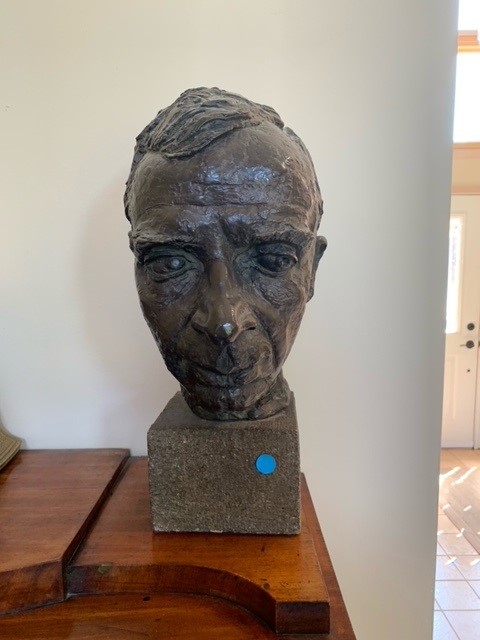Adolph Oko
Sir Jacob Epstein (New York 1880–1959 London)
Bronze, 1923
Cincinnati Skirball Museum, gift of the W. Gunther Plaut Family
Adolph S. Oko (1883–1944), librarian, scholar, and philanthropist, was born near Kharkov, Russia. Educated in Germany, Oko came to the United States in 1902. After working in the Astor Library in New York from 1905–1906, Oko became chief librarian of Hebrew Union College in Cincinnati, a position he held until his resignation in 1933, over a marital scandal.
Under Oko, the Library flourished, outgrowing its quarters twice. Shortly after World War I, Oko went to Europe and acquired some 18,000 volumes for the Library, including the Edward Birnbaum music collection; a fine Spinoza collection; the Chinese Jewish manuscripts of Kai-Feng-Fu; and an outstanding collection of incunabula (books printed before 1501). Oko also helped to start the Hebrew Union College Museum, which today thrives as the Skirball Museum. In 1931, the College awarded to Oko the degree of D.H.L., honoris causa.
Upon his resignation from Hebrew Union College, Oko and his second wife moved to England, where he completed his Spinoza Bibliography. A devotee of the Dutch philosopher Baruch Spinoza, Oko was a founder and United States secretary of Societas Spinozana, an organization concerned with Spinoza’s life and works, and was a trustee of Domus Spinozana in The Hague, Holland. The Okos remained in England until 1938, at which time they returned to the United States and Oko joined the staff of the American Jewish Committee. In 1943 Oko became associate editor of the AJC magazine Contemporary Jewish Record, and was serving in this capacity until his death in New York in 1944.
Oko wrote many essays and bibliographies, contributing many articles to the Menorah Journal, of which he was an associate editor. Among the bibliographies he published were his Spinoza Bibliography and works on Solomon Schechter and Kaufmann Kohler.
Though not a man of means, Oko was extremely active in philanthropic work, making use of his reputation as a librarian and scholar and with a talent for persuading friends to provide necessary funds. He made tremendous efforts to rescue colleagues, friends, and their families and friends from Europe before World War II and was expert at providing funds for impoverished colleagues in a manner that would not injure their pride.
Sir Jacob Epstein was an American British sculptor who helped to pioneer modern sculpture. Born in New York to Polish Jewish refugees, he joined the Art Students League in 1900. He worked in a bronze foundry by day and studied drawing and sculptural modelling at night. He moved to Paris in 1902, then to London, where he settled and became a naturalized citizen in 1910. Epstein was known for producing controversial works that challenged ideas on what was appropriate subject matter for public artworks. His likenesses were rooted in observation but he experimented with an expressive approach to form and texture to evoke the physical and psychological presence of the sitter. Among his sitters were Joseph Conrad, George Bernard Shaw, Albert Einstein, and Somerset Maugham.
Epstein’s bust of Oko was exhibited in January–February 1924 at the Leicester Galleries in London, where it was greatly lauded by the London press as being one of the most interesting of the great sculptor’s collection. Oko sat for Epstein during a visit to London. The two men met as boys in New York City and remained lifelong friends. Epstein also sculpted a bust of Oko’s daughter Pearl in 1926. That work is in the collection of Hebrew University, Jerusalem.

